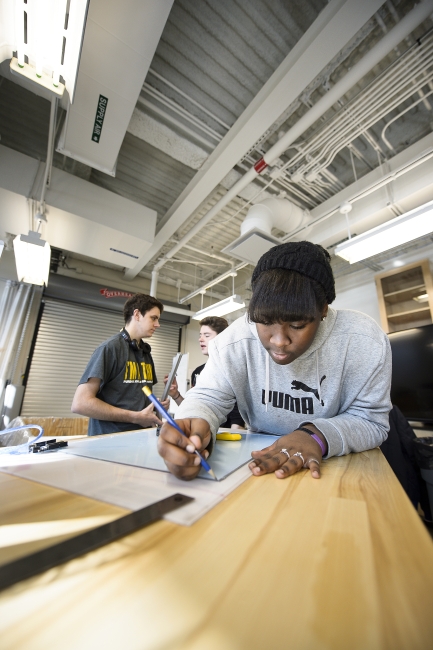You have /5 articles left.
Sign up for a free account or log in.

Students in pilot version of Purdue U's new competency-based degree
Purdue University
Competency-based education isn’t for everyone, say even supporters of the emerging form of higher education.
Many of the 600 or so colleges that are trying to add competency-based degrees are focused on adult, nontraditional students who want a leg up in the job market. Some of those academic programs have been developed in collaboration with specific industry partners, where an employer’s endorsement of the credential can lead to a graduate employee getting a promotion.
Other colleges' forays into competency-based education have been in disciplines with professional licensing and a heavy dose of task-based learning, which seems like an easier fit with academic programs based on mastery rather than time in a classroom.
That seems particularly true for research universities. For example, the University of Michigan’s first competency-based degree is a master’s of health professions education. And the University of Texas System began with a bachelor’s in biomedical science.
The toughest nut to crack for competency-based education appears to be bachelor’s degrees aimed at traditional-age students. But that’s what Purdue University is doing with a newly approved bachelor’s in transdisciplinary studies in technology. And the customizable, competency-based degree from the new Purdue Polytechnic Institute combines technical disciplines with the humanities.
Purdue’s personalized, interdisciplinary approach is a promising one, said Charla Long, executive director of the Competency-Based Education Network, a relatively new group of colleges and universities.
“Competencies can be developed outside your discipline,” she said, “and be as relevant to your discipline.”
Purdue also is less overtly focused on job training -- or at least on graduates’ first jobs -- than some might expect with a competency-based degree. In fact, the university's approach sounds like an experimental form of liberal arts education.
“It’s about preparing students for life,” said Jeff Evans, interim associate dean for undergraduate programs at Purdue, who adds that graduates of the program “will be ready to adapt to this fast-changing world.”
The public university began working on the new competency-based degree program in 2014. Mitch Daniels, Purdue’s president and Indiana's former governor, previously created the Purdue Polytechnic Institute, which has been tasked with working on transformational forms of undergraduate education. The institute, which is located at eight branch locations as well as Purdue's main campus, won a university-sponsored contest with its idea for the new competency-based degree.
Customization is a big part of the degree’s novelty.
Incoming students will be able to work one-on-one with a faculty mentor to create personalized plans of study, Purdue said, which will blend technology-focused disciplines such as computing, construction management, engineering, and aviation with social sciences, the humanities and business.
“We’re trying to connect the passion of the students with their journey of learning,” said Evans.
Graduates will get not only technical competence, the university said, but also skills employers need for a “thinking economy.” That means complex problem solving, effective communication, critical thinking and ethical judgment. And students will earn digital badges and produce e-portfolios to display their work on completed projects.
For example, Evans described the experience of a student who participated in a pilot version of the degree program. The student wanted to build musical instruments. So the student's resulting path of learning, created jointly with a faculty mentor, included competencies on the technical side, such as mechanical engineering, as well as in the psychology of human behavior, music and business.
Such an interdisciplinary approach would not fit into a typical four-year degree program, said Evans.
“In order to do that in a traditional sense, this student would have to get at least one major and three minors,” he said of the breadth of learning in the new competency-based program. “That’s what we do with every single student.”
Boon for Competency-Based Ed?
An initial group of 36 Purdue students signed up for the pilot version of the degree program, university officials said. That number dipped a bit as Purdue awaited approval from its regional accreditor, the Higher Learning Commission (HLC). The university announced this week that the commission had signed off on the program.
Purdue’s degree track is based on the credit-hour standard, in which the demonstration of competencies is linked to corresponding college credit. This approach differs from relatively new competency-based offerings from a handful of other institutions, which use a method called direct assessment. That model is completely untethered from the credit hour, and students can move on as soon as they demonstrate mastery of required concepts.
At Purdue, however, studio and seminar-style “learning environments” will account for 35 percent of students’ plan of study.
The U.S. Department of Education has taken some heat from its own Office of the Inspector General for approving direct-assessment degrees. Experts say that criticism, and an inspector general audit of Western Governors University over the faculty role in competency-based education (the results of which have yet to be made public), have had a chilling effect on how regional accreditors view proposals for new direct assessment and other competency-based degrees.
As a result, the HLC’s green light for Purdue’s new degree may be welcome news to some.
“When an accreditor shows a willingness to consider and approve different models for competency-based education,” Long, of the Competency-Based Education Network, said, “it continues to help the field think about how they can innovate responsibly.”
The new transdisciplinary studies in technology degree from Purdue features eight broadly defined primary competencies. To graduate, students must demonstrate mastery in areas like design thinking, effective communication, social interaction on a team, ethical reasoning, and innovation and creativity. Each of those competencies is split into five subcategories, the university said.
Evans said faculty members drew from various academic explorations of competencies and learning outcomes to create the degree, including material from the Association of American Colleges & Universities, a group that focuses on liberal education.
Purdue also drew input from employers and industry representatives, he said, including members of the Dean’s Council at the Polytechnic Institute. Employer groups, such as the National Association of Manufacturers, praised the new degree in written statements.
Evans said the new program will seek to prepare graduates for careers with unpredictable twists and turns, which are common in the knowledge economy.
“Things are changing fast,” he said, adding that “the general population really does need to become more STEM aware.”
Purdue will move deliberately with the program’s expansion. Evans said the university will closely monitor the new degree track’s different approach to teaching and small student-to-faculty ratio as it considers how to offer such degrees to larger numbers of students.
Even so, the Polytechnic Institute is likely to eventually incorporate quite a bit from competency-based education, he said.
Purdue’s experiment is worth watching, said Long. But some elements of the new program might be difficult to replicate elsewhere, at least to big groups of students.
“To scale a program with this level of customization would be challenging,” she said.




